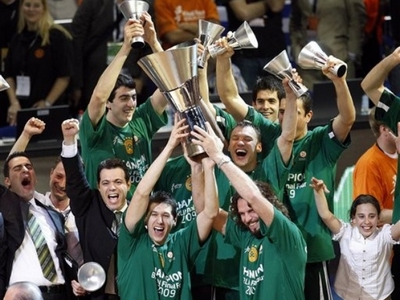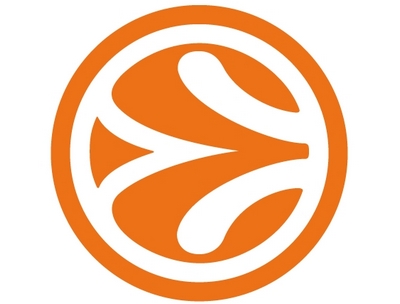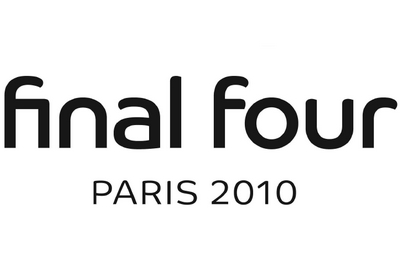
We present some varying storylines from the weekend:
CSKA Comes out Flat
48-28 was the score at the end of the first half, with Panathinaikos finishing on a huge run sparked by seven straight made 3-pointers, and some of the best half-court defense weve seen all year. The Greeks locked down the paint completely, controlled the glass, and made CSKA shoot almost exclusively long 2-pointers, forcing J.R. Holden to dominate the ball and make plays on his own. Siskauskas, Trajan Langdon, Matjaz Smodis and Viktor Khryapa combined to score just 9 points in the first half, and CSKA could not make a single 3-pointer, while Panathinaikos went 8-14.
Down by 20, CSKA came out with a huge chip on their shoulder, and immediately made their presence felt on the game with a much stronger effort defensively and on the glass, with a new emphasis offensively on pounding the ball inside. Trajan Langdon was the man in the third quarter, showcasing his smooth pull-up jumper and terrific ability to change speeds with his crafty drives.
CSKA managed to cut the lead in half by the end of the third, and then continued to chip in the way thanks to some strong offensive rebounding (particularly from Smodis and Khryapa) and more fourth quarter heroics from Ramunas Siskauskas. In the end, it may have been poor free throw shooting that did them in, with Siskauskas uncharacteristically missing three attempts (after coming in to this weekend having knocked down his previous 40 in a row) and Khryapa bricking an especially important pair in the closing minutes.
Despite hitting an incredibly clutch pull-up 3-pointer in the previous possession, Siskauskas could not get his next attempt to fall in the closing seconds, which sealed the score at 73-71, and gave Panathinaikos the Euroleague title, in what will likely will go down as one of the best Final Fours in European basketball history.
David Andersen the Man for Barca, Again
In the awkwardly unnecessary 3rd/4th place game previous to the final, Barcelona managed to easily knock off a very jaded Olympiacos squad, in large part due to another terrific outing by Australian big man David Andersen, with 20 points in 26 minutes, on 8-12 shooting (3/5 3P). Although this wasn't the most competitive setting you'll find, Andersen still did a nice job showcasing his excellent skill-level, primarily in the form of his jump-shot, knocking down an array of spot-up, pull-up, turnaround and pick and pop jumpers, in the post, from 18-20 feet, and all the way out beyond the 3-point line.
After the game, we managed to catch up with Andersen in the VIP area, which gave us an opportunity to pick his brain on where he stands in terms of the NBA.
Andersen didnt hesitate to indicate his interest in playing for the Atlanta Hawks, or any other team that might be interested in his services. He did seem a bit frustrated by the predicament hes in, thought, with his NBA rights essentially being held hostage by the Atlanta Hawks.
I just wish they would give me a straight answer either way. Every year its the same thing. If they want me, great, but if not, I would like to go play somewhere else. I cant force the tender and go play on a non-guaranteed minimum contract, but I dont think Im asking for crazy money either.
Andersen has another year on his deal with Barcelona, but has a clear NBA escape clause in his contract that that he can exercise until July 15th. That is a difficult situation for Barcelona, as they will be in serious limbo until that pointessentially the very tail end of the signing period for elite European clubs, where there will likely be few if any big men of Andersens caliber on the market. Barcelona has an option to buy out Andersens contract, and may be forced to do so if they feel like they cannot wait on the NBA to act.
Whats most unfortunate for Andersen is that he had already received assurances from former Hawks GM Billy Knight that they would bring him over to the NBA last summer, but that plan went to naught once he was fired and replaced by Rick Sund, who said he needed another year to evaluate him. The Hawks have apparently had multiple teams try to acquire Andersen in a trade, but have been reluctant to deal him for fear that he may make them look foolish in another teams uniform. Based on the way Andersen has looked here in Berlin, thats a legitimate possibility.
This situation really goes a long ways in emphasizing the challenges that players in Europe often face when being drafted by NBA teams in the second round, as they are essentially able to hold their rights perpetually without any recourse on the part of the players. This may be something that the NBA Players Association may want to look at in the upcoming Collective Bargaining Agreement, as it would probably be much more fair to put a three year limit in which teams can either sign their draft pick or be forced to relinquish their rights. Unfortunately the players that make up the union will likely have very little sympathy for the cause of European draftees who are essentially competing for their jobs.
After the game, we managed to catch up with Andersen in the VIP area, which gave us an opportunity to pick his brain on where he stands in terms of the NBA.
Andersen didnt hesitate to indicate his interest in playing for the Atlanta Hawks, or any other team that might be interested in his services. He did seem a bit frustrated by the predicament hes in, thought, with his NBA rights essentially being held hostage by the Atlanta Hawks.
I just wish they would give me a straight answer either way. Every year its the same thing. If they want me, great, but if not, I would like to go play somewhere else. I cant force the tender and go play on a non-guaranteed minimum contract, but I dont think Im asking for crazy money either.
Andersen has another year on his deal with Barcelona, but has a clear NBA escape clause in his contract that that he can exercise until July 15th. That is a difficult situation for Barcelona, as they will be in serious limbo until that pointessentially the very tail end of the signing period for elite European clubs, where there will likely be few if any big men of Andersens caliber on the market. Barcelona has an option to buy out Andersens contract, and may be forced to do so if they feel like they cannot wait on the NBA to act.
Whats most unfortunate for Andersen is that he had already received assurances from former Hawks GM Billy Knight that they would bring him over to the NBA last summer, but that plan went to naught once he was fired and replaced by Rick Sund, who said he needed another year to evaluate him. The Hawks have apparently had multiple teams try to acquire Andersen in a trade, but have been reluctant to deal him for fear that he may make them look foolish in another teams uniform. Based on the way Andersen has looked here in Berlin, thats a legitimate possibility.
This situation really goes a long ways in emphasizing the challenges that players in Europe often face when being drafted by NBA teams in the second round, as they are essentially able to hold their rights perpetually without any recourse on the part of the players. This may be something that the NBA Players Association may want to look at in the upcoming Collective Bargaining Agreement, as it would probably be much more fair to put a three year limit in which teams can either sign their draft pick or be forced to relinquish their rights. Unfortunately the players that make up the union will likely have very little sympathy for the cause of European draftees who are essentially competing for their jobs.
Zeljko Obradovic: the NBA is just a show
In the press conference following his teams victory over CSKA, legendary Panathinaikos head coach Zeljko Obradovic (now the winner of seven European championships) expressed some very controversial, yet wide-spread opinions when asked about his thoughts on coaching in the NBA.
I am very happy in Europe, coaching for Panathinaikos. I love European basketball. I believe that the NBA is a competition that everyone likes to watch. There are many coaches in Europe that are ready to coach in the NBA. I personally never thought to go. I believe it is very different, basketball during the regular season. The NBA is a show, while here we play to win every game. In the playoffs, NBA games are very good, but the rest of it is just a show. We must win every game in Europe, this is our life.
Although not expressed in very tactful fashion, Obradovics point is well-taken, and really hammers home the main complaint that basketball industry people on both sides of the ocean regularly express about the NBA regular seasonits just too long for teams to be competitive for 82 games, which leads to a severely watered down product.
European basketball players compete in only one or two games a week at most, and thus obviously play much harder during their regular season. While few will argue the virtues of the NBA playoffs, with the amazingly high level of basketball that goes along with it, many continue to question what about the six-month period between November and mid-April?
This same topic (in a very different context) came up in fact at the MIT Sloan Sports Analytics conference we attended a few months ago in Boston, in a panel with former NBA head coach Jeff Van Gundy, Houston Rockets GM Daryl Morey and ESPN.com writer Bill Simmons. Everyone there was in agreement that the NBA product is suffering at the moment from this problem, with Simmons pointing out that the drain on athletes is too much, and the product suffers in turn.
Daryl Morey did not think that less NBA regular season games necessarily means that there would automatically be less revenue brought in. He took that one step further in fact, pointing out that "the NCAA tournament, in 63 games, makes more TV money than the local TV money for the entire NBA regular season of 1,200-plus games."
In his view, the importance of a particular game and the uncertainty of the outcome are the two biggest factors in determining how much money can be made from tickets or TV rights to a specific game, with price being a distant third. Having too many games dilutes that, and owners would be able to make more money on the back-end if they were able to sell fewer games for a much higher price.
So while the Serbian Obradovic surely wont be winning many fans with his blunt and borderline-degrading assessment of the NBA, there is surely some truth to his words.





























Comments